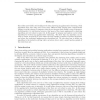Free Online Productivity Tools
i2Speak
i2Symbol
i2OCR
iTex2Img
iWeb2Print
iWeb2Shot
i2Type
iPdf2Split
iPdf2Merge
i2Bopomofo
i2Arabic
i2Style
i2Image
i2PDF
iLatex2Rtf
Sci2ools
107
click to vote
COLT
2010
Springer
2010
Springer
Robust Hierarchical Clustering
One of the most widely used techniques for data clustering is agglomerative clustering. Such algorithms have been long used across many different fields ranging from computational biology to social sciences to computer vision in part because their output is easy to interpret. Unfortunately, it is well known, however, that many of the classic agglomerative clustering algorithms are not robust to noise [14]. In this paper we propose and analyze a new robust algorithm for bottom-up agglomerative clustering. We show that our algorithm can be used to cluster accurately in cases where the data satisfies a number of natural properties and where the traditional agglomerative algorithms fail. We also show how to adapt our algorithm to the inductive setting where our given data is only a small random sample of the entire data set.
Agglomerative Clustering | Agglomerative Clustering Algorithms | Algorithm | COLT 2010 | Machine Learning |
Related Content
| Added | 10 Feb 2011 |
| Updated | 10 Feb 2011 |
| Type | Journal |
| Year | 2010 |
| Where | COLT |
| Authors | Maria-Florina Balcan, Pramod Gupta |
Comments (0)

